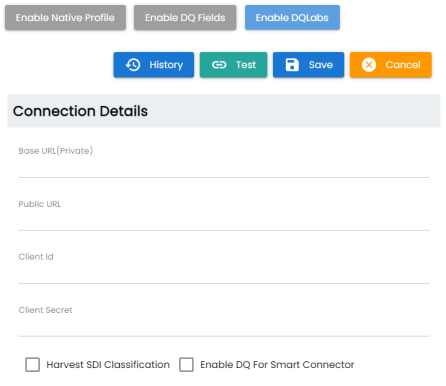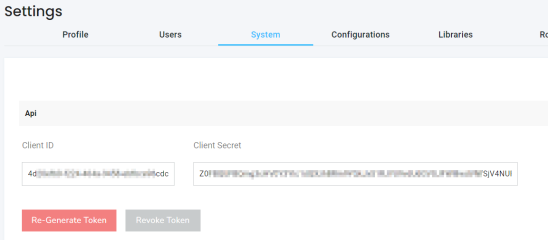Data quality scores (DQ scores) enable you to measure your data's quality. A higher DQ score indicates better accuracy and completeness of data. To provide data quality capabilities, erwin Data Intelligence (erwin DI) integrates DQLabs as data quality analysis partner. To run data quality profiling, you need to configure DQLabs in your erwin DI application.
Configuring DQLabs in erwin DI requires Client ID and Client Secret details available in your DQLabs instance. To get configuration details from DQLabs instance, refer to Accessing DQLabs Configuration Details.
DQLabs now supports Single Sign-On (SSO). For more information, refer to the DQLabs SSO configuration guide.
To configure DQLabs, go to Application Menu > Settings > Miscellaneous Configurations > Data Profiling Configuration.
The Data Profiling Configuration tab displays configuration options.
Use the following options for setting up data profiling configuration:
- Enable Native Profile: Use this option to enable and set up a DQLabs profile for erwin DI and DQLabs sync and data profiling.
- Enable DQ Fields: Specifies that only selected data quality parameters will be displayed across the assets in your organization.
- Enable DQLabs: Use this option to enable DQLabs integration using connection details, and schedule a sync job. For more information, refer to Enabling DQLabs.
Enabling DQLabs
To enable DQLabs integration, follow these steps:
- On the Data Profiling Configuration tab, click Enable DQLabs.
- Click
 .
.
The DQLabs Configuration tab switches to edit mode. - On the Connection Details section, switch Enable Integration with DQLabs to ON.
- Enter appropriate values in the fields. Refer to the following table for field description:
- Click
 .
.
The DQLabs configuration is saved.
The connection details for DQLabs configuration appear in edit mode.
This configuration requires Client ID and Client Secret from your DQLabs instance. To get configuration details from DQLabs instance, refer to Accessing DQLabs Configuration Details.

|
Field Name |
Description |
|---|---|
|
Base URL (Private) |
Specifies the base URL of your DQLabs instance. For example, https://cloud.dqlabs.ai |
|
Public URL |
Specifies the public URL of your DQLabs instance. For example, https://cloud.dqlabs.ai |
|
Client Id |
Specifies the alphanumeric client ID of your DQLabs instance. For example, 2ax1x3xde-b8x8-4b134-aa08-xxx303p2b86f1fk |
|
Client Secret |
Specifies the client secret of your DQLabs instance. |
|
Harvest SDI Classification |
Specifies whether SDI classifications for technical assets are imported and updated in DQLabs along with the DQ Score. |
|
Enable DQ For Smart Connector |
Specifies whether to sync the DQ Scores from DQLabs for the assets based on smart connectors. |
|
Organization Name |
Specifies the organization name for the smart connector. This option is available when the Enable DQ For Smart Connector is enabled. |
To test the configuration, click ![]() . If the connection with the DQLabs instance is established successfully, then a success message appears.
. If the connection with the DQLabs instance is established successfully, then a success message appears.
You can then access it from erwin DI. To access DQLabs, go to Application Menu > Data Quality.
The next steps involve adding datasets in the DQLabs and then, scheduling a DQLabs job.
Accessing DQLabs Configuration Details
To access Client Id and Client Secret in your DQLabs instance, follow these steps:
- Login to DQLabs.
Your DQLabs instance opens. - On the app menu, click
 > Setting > Organization tab.
> Setting > Organization tab. - Click Edit, then go to Systems tab and expand Api section.
The Api section displays the Client Id and Client Secret.
- Hover over the values and click
 to copy them, and paste them into erwin DI's DQLabs Configuration section.
to copy them, and paste them into erwin DI's DQLabs Configuration section.
|
Copyright © 2023 Quest Software Inc. |